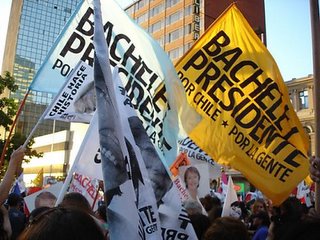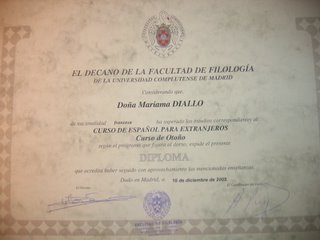 Chile tiene una mujer presidente, y eso es historia!!
Chile tiene una mujer presidente, y eso es historia!!La Menche
 Chile tiene una mujer presidente, y eso es historia!!
Chile tiene una mujer presidente, y eso es historia!! "Hay que sujetarse los pantalones, porque viene dura", advierte, en tono alegre, la escritora Pía Barros, mientras Pablo Huneuus anticipa que no es "ni la revolución, ni la gran transformación".
"Hay que sujetarse los pantalones, porque viene dura", advierte, en tono alegre, la escritora Pía Barros, mientras Pablo Huneuus anticipa que no es "ni la revolución, ni la gran transformación".
There it is, can you see it.... ? Click on the image to make sure you see it properly...
And I got a 8,5: passed with distinction!!!!
The proof that I am integrating as an "extranjera" in
Now, I am ready to confront the difficult task of finding a job... My feelings and emotions are jumping from very enthusiastic when I apply for jobs, to very low energy when I see that to find a paid job here you really need to find your way in, especially in my specific field.
"Pero, señora, si usted está altruista, no profesional y le gusta ayudar, puede ser voluntaria, porque no hay dineros... somos organismos sin animo de lucro.... pero sí, sí, no importa que no esta remunerado... necesitan todavía tener una entrevista, una lista de competencias, nada mas fácil!" hmmmmm..... For example, to distribute Christmas cards of the UNICEF, they were requiring experience at the United Nations... Because it is VERY hard to do... "do you understand?" pffff...
What a challenge and I took Cristina on boat with me.... Sorry mi Amor!
Anyway, we discharge ourselves by going to Lucas, our favorite bar de copas and Entredos, a women's association which has a very agreeable lounge where you can spend hours....
Pero, mi español está a nivel muy alto, y tengo confianza que voy a encontrar mi felicidad! Bueno, en el trabajo yo estoy hablando... porque con el Amor estoy muuuuuy feliz....
Besitos a todos y espero leer de sus noticias pronto.
Mariama - 12 January 2006
 I hope you had a good end of the year and that 2006 has new plans for you, that is, only if you want them.
I hope you had a good end of the year and that 2006 has new plans for you, that is, only if you want them. Living in a small place is not easy, you are always bumping into your doors, your walls, the papers, or the glasses, and so we have broken some precious things around the house. I guess this helps us to learn to let go precious things, but most important, it also helps us to learn to love new coming things. Life in Spain has been nothing but that, learning to love the new coming things, even when they are little. Life is loud here! Very loud, we lived in the middle of the gay town where there are plenty bars for gay and heterosexual people. Sometime that is fun, others is a pain in the neck, because you get all the curious man wanted to see the “lesbians” on the street. But doesn't matter what time it is, there is always something open for a "copa" or for a dance, and that is very helpfull for new arrivals!
Living in a small place is not easy, you are always bumping into your doors, your walls, the papers, or the glasses, and so we have broken some precious things around the house. I guess this helps us to learn to let go precious things, but most important, it also helps us to learn to love new coming things. Life in Spain has been nothing but that, learning to love the new coming things, even when they are little. Life is loud here! Very loud, we lived in the middle of the gay town where there are plenty bars for gay and heterosexual people. Sometime that is fun, others is a pain in the neck, because you get all the curious man wanted to see the “lesbians” on the street. But doesn't matter what time it is, there is always something open for a "copa" or for a dance, and that is very helpfull for new arrivals!  the education part of it, is coming much slowly as it happens everywhere. In the city is relative safe to be gay, although you have to live constantly through the curious eyes of people, who probably still wondered how “we do it”. Outside of Madrid is another story and is the same as being in a suburb outside of Newtown or Erskinville, where you are looked at as if they want to kill you or at least hit you. But I guess this is no news for all of you, so I won’t bore you with more details in this matter.
the education part of it, is coming much slowly as it happens everywhere. In the city is relative safe to be gay, although you have to live constantly through the curious eyes of people, who probably still wondered how “we do it”. Outside of Madrid is another story and is the same as being in a suburb outside of Newtown or Erskinville, where you are looked at as if they want to kill you or at least hit you. But I guess this is no news for all of you, so I won’t bore you with more details in this matter.